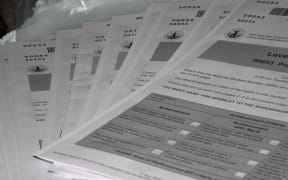
New tests could make it harder for some students to get NCEA, principals say. Photo: 123RF
Some principals are shocked by their students' high failure rates in a trial run of new NCEA literacy and numeracy tests.
Year 10 students have trialled the tests, which will be compulsory in 2024.
Principals and teachers have told RNZ all Year 10 students at at least one school failed the writing test and at others two-thirds to a half failed it.
Some also reported pass rates below 50 percent for the numeracy test.
They said some of the schools with poor results had good NCEA pass rates and drew students from high socio-economic backgrounds who were expected to do well.
Overall results from the June trial of the online tests were expected to be published later this month but a smaller trial last year saw failure rates of two-thirds for writing and one third for both reading and numeracy.
In the meantime, the results of individual schools have alarmed some principals and teachers because from 2024 students must pass all three assessments before they could be awarded any NCEA certificates.
Principals warned that some might never pass and others would need several attempts.
Onehunga High School principal Deidre Shea said 40 Year 10 students opted to do the trial tests at her school.
She said the students felt they had done well and most had achieved the reading and numeracy assessments but the writing test "was a little harder".
"For most students they will be looking to achieve literacy and numeracy certainly by the end of their Year 11 year, but there are some students, and there will always be some students, for whom it will be a longer journey," she said.
Shea said teachers and students needed to accept that it was okay to attempt the tests when students were ready, rather than expecting them to pass by a particular age or year level.
She said in the long run the tests should not decrease NCEA achievement rates because schools would ensure students were better equipped to meet the new requirements.
James Cook High School principal Grant McMillan said the tests were piloted on Year 10 students but when introduced in 2024 would be sat mostly by Year 11 students.
He said the online nature of the tests narrowed what could be assessed and essentially came down to how well students could spell and type.
McMillan said some of the so-called literacy crisis was real, but a lot of it was driven by universities pushing their expectations on to schools even though most school students would not go to university.
"We need to be very, very careful what we're expecting of students at level 1 [NCEA] which is just like your learner's driver licence. It doesn't actually get you anywhere but it's the first in the progression.
"We're not asking for things that are too high or demanding. It needs to be fair and appropriate. And I think right now we've probably pitched it a bit high."
McMillan said he had asked the Qualifications Authority to run the trial tests again with students in Years 11,12 and 13 and first year university.
"I'd really like to see what age level or what qualification level can actually cope with and pass these tests en masse and I suspect it's slightly higher than we perhaps believe it might be."
Burnside High School deputy principal Alan Robertson said about 130 Year 10 students at the school sat the numeracy test in June.
He said the pass rate was "fairly good" but lower than the school's achievement rate for the current numeracy requirement of 10 credits in particular NCEA standards.
"I've got the feeling that it's probably a little bit more difficult than it has been in the past," Robertson said.
He said the questions had a "reasonably high" literacy requirement, so students had to read and unpack questions.
"Overall it will probably lower the achievement rates. Perhaps not significantly. But there are some things in there that are going to be difficult just around the comprehension and the literacy," he said.
"A simple-ish sort of mathematical problem is under a few layers of a story, or a context which may involve some words which are at a reasonably high level for 14-15-year-old students. So, if they come across a context with some words in it that they are not all that familiar with then that sucks up time for them to comprehend what the question's about before they can even get to the mathematics behind it."
Robertson said the introduction of the tests in 2024 would probably stop some students from achieving NCEA certificates.
However, he said the level of maths in the test was about right.
Last year's numeracy test asked students to answer questions about distance and direction on a map, interpret a bank statement, and calculate the price of a product.
Sample writing questions included "write a script for a video to introduce your YouTube channel to new subscribers" or "write about a trip that you have been on".
Students were also asked to correct a sentence with grammar and punctuation errors or rewrite a sentence so its meaning was clear.
Association of Teachers of English vice-president Pip Tinning said some schools were reporting that three-quarters of their students had failed the writing test.
She told Morning Report improving students' performance would involve entire schools, not just the English teachers, looking at the results and understanding what areas students were weak.
"We actually need to know what's coming out of those tests and what we need to address as a whole sector. I don't think it's just a 'here English department you go sort this'," she said.
"I think that data tells us there needs to be a bit of a sense of urgency about it," she said.
Tinning said the results indicated more than "some" students would fail the writing the test and be ineligible for an NCEA certificate.
"It's not even some. If we're looking at anecdotally maybe about 30 percent passing that's not 'some', that's 70 percent who can't get it," she said.
A year was not much time to turn the results around, Tinning said, warning that teachers were already burning out at an alarming rate from over-work.






